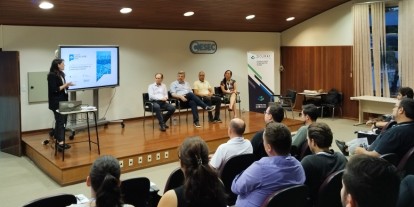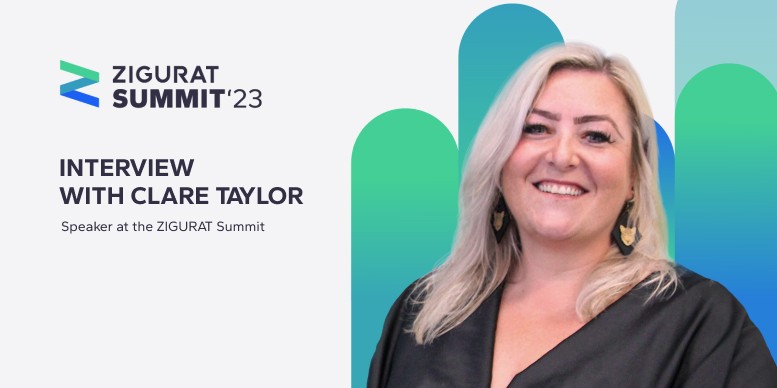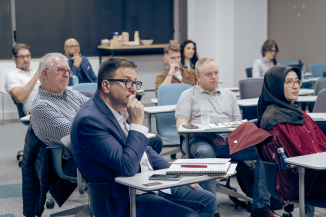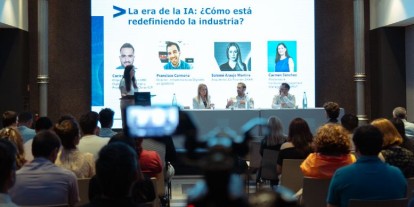
Clare Taylor: “We are all unique and with the right adjustments this can be a great, powerful thing for the industry”
Categories

Clare Taylor is National Rehearsal Lead at MWH Treatment, BIM4Water Chair and lecturer for the Master’s in Global BIM Management in Civil Engineering and GIS at ZIGURAT. On 27 July, she will participate in the ZIGURAT Summit as a speaker on the panel “Driving Equity with Organisational Change Management and Innovation”.
In this interview, we aim to discover her vision and learn the power of digitalisation, data, and diversity to create equitable workspaces.
What encouraged you to participate in the ZIGURAT Summit?
One of the great things about ZIGURAT Institute of Technology is it being open and accessible to students across the globe in over 120 countries. Although teaching in the virtual environment is fundamental to achieving this, it is fantastic that the institute host in person events, to enable those true networking connections to form.
In particular, I was really encouraged to participate in the ZIGURAT Summit panel discussion on driving equity with organisational change management and innovation. I am passionate about the power of digitalisation and its capabilities to be all encompassing and inclusive. Whether that be overcoming challenges faced by neurodiversity, to facilitating engineer and operational staff communicating, to attracting a more diverse population to the sector, or creating equitable workspaces.
Digitalisation and the art of the possible is really thrilling, and I believe change, although it can be intimidating and needs the right supporting processes, can be exciting and put the fun and curiosity back into the workplace.
What is the industry's current situation regarding equity and change management?
Organisations are investing in new technologies, systems and processes and as a biproduct they are having to manage people and social challenges that come with it. Change management is part and parcel with digital transformation, you cannot have one without the other. With this comes huge opportunities to create value, innovate and foundationally change the conversations to be more inclusive.
I do not believe organisations realise the power of digitalisation and its role to play in creating equitable workplaces. There is a focus on creating diversity frameworks in terms of culture and geography, but not in being able to unlock innovation by harnessing visualisation and collaboration through interconnected data. Demonstrating a diverse organisation will attract new talent, but investing in digital initiatives, tools, and process will retain and nurture those within.
Part of my role is to understand how people communicate and how messages/data are received or perceived. When presenting a visualisation I need to be mindful that I am communicating the key data in a format that will be most widely received, whether that be to people of neurodivergent characteristics, of non-engineering or technical background, someone of disability (deaf, colour-blind, blind), people with illiteracy. My team and I are consciously being equitable for better outcomes. The more people who understand the data, the more opportunity there is to spot efficiencies, mitigate risks at the right time and allow space to innovate.
I do believe there is a significant change in the industry. Industry can no longer be careless or thoughtless in assuming everyone operates, communicates or processes data in the same way, we are all unique and with the right adjustments this can be a great, powerful thing.
What is the recipe for consolidating a leadership position in this area?
Have a child's mentality, be curious and open to learn new things, but be mature enough to understand what adds value and what is just for show. I have always loved to learn new things, so the fast pace of digitalisation suits my personality. I have within my work experience made sure that I expose myself to a variety of job roles to ensure I understand the project delivery lifecycle from concept to asset handover, from being a Civil Engineering Designer, Project Manager, 4D Planner, National Rehearsal Lead. I have then layered on my understanding of how digital initiatives can support and add maximum value to this workflow. So I would encourage people to learn your business well and then go and look for those innovations that can truly add value and benefit.
Also, the biggest one – network! Go to conferences, say “yes” to providing your specialist knowledge as a professor in academia, go chair or support an industry forum, build connections both within and outside your industry . Being resourceful and having a wide spectrum of connections has been one of my best achievements, you will become invaluable as an integrator. And again, it is also just interesting to meet new people and learn.
How do you see the future of the sector?
The future of the digital sector in my opinion will be focusing on looking inwardly, using the data captured for driving and influencing business strategies, but also being open to share data across national/global scale. If a national or global ontology can be created across multiple sectors and initiatives, then we can accelerate digital transformation as one.
The use of AI in the digital sector will allow businesses to optimise processes, whilst mitigating risks, allowing quicker dispute resolution and informed decisions. AI enables compound change and ease of scaling and this has always been a barrier in deploying digital initiatives effectively, how can businesses take proofs of concepts (POC) and scale them up under the change management principles.
The skills required in the sector are going to adapt to accurately interrogate the information, this is where the jobs and skills of the future are yet to be known. And although the industry and academia cannot predict those roles yet, what it can do is actively nurture the skills that may be needed in data science, analytics, information managers and data security and governance. Who knows what the prospects of the digital sector shall be?


